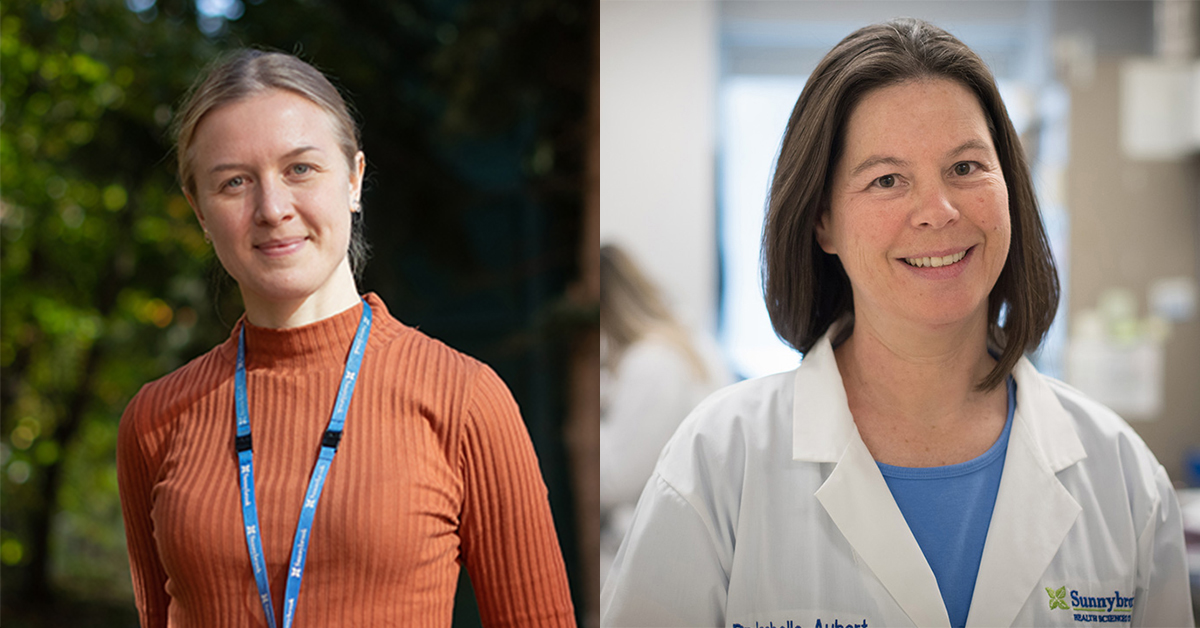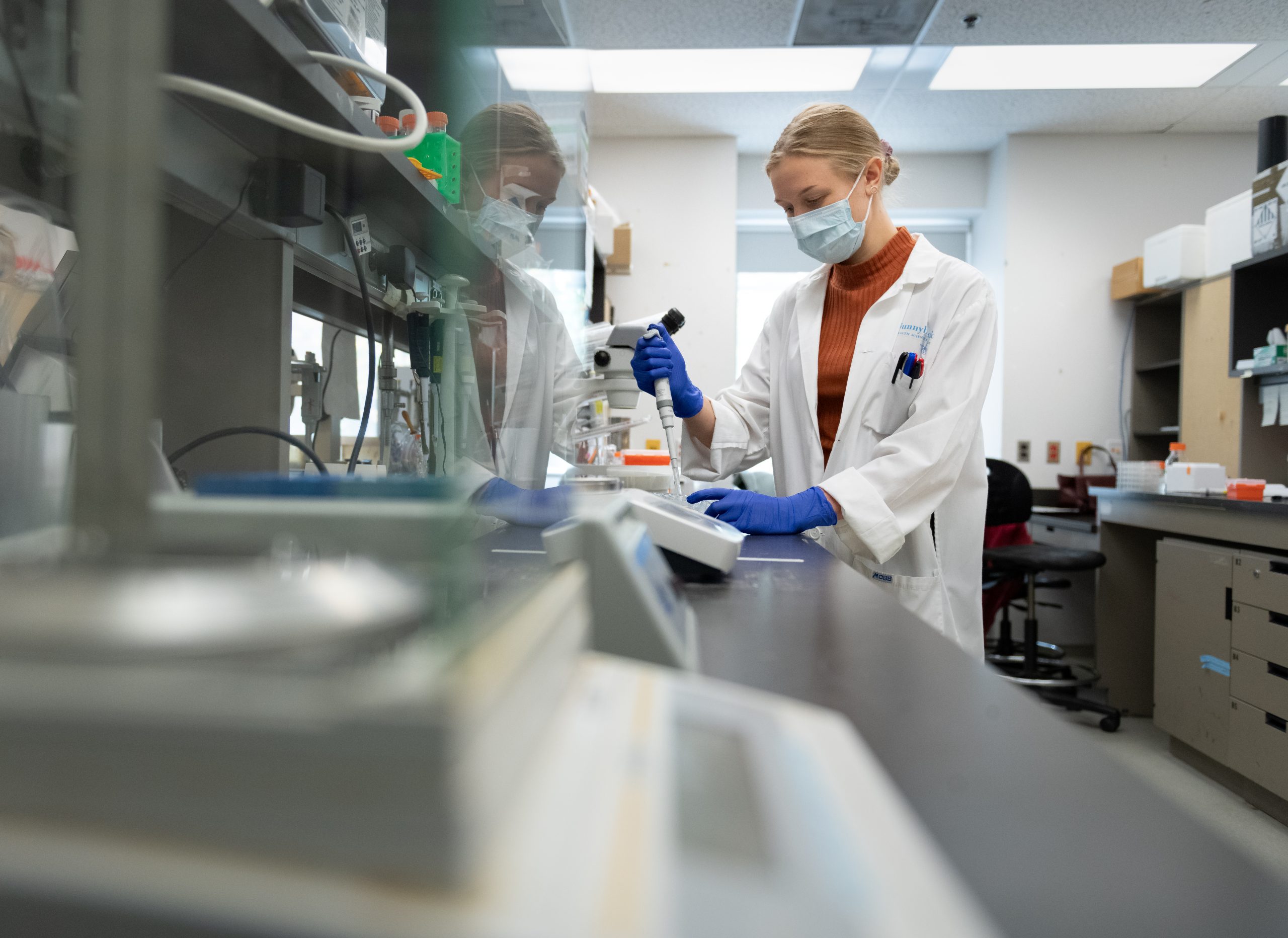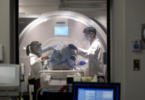
Dr. Rikke Kofoed and Dr. Isabelle Aubert
In a new study, postdoctoral researcher Dr. Rikke Kofoed and senior scientist Dr. Isabelle Aubert and their team at Sunnybrook Research Institute determined the feasibility and safety of two noninvasive methods for delivering gene therapy to the brain in a preclinical model of Alzheimer’s disease.
The study has been published in Molecular Therapy – Methods & Clinical Development.
Alzheimer’s disease is the most common form of dementia, which impacts more than 430,000 Canadians aged 65 years and older. Hallmarks of the neurodegenerative disease include “plaques” and “tangles” composed of toxic protein that develop in the brain and eventually prevent the production of nutrients and the transmission of signals that are necessary for the health of brain cells. Over time, this causes deficits in cell-to-cell communication and functions, leading to memory loss, confusion and difficulty reasoning. There is currently no effective treatment for the disease.
Researchers at Sunnybrook are interested in gene therapy as a potential treatment for Alzheimer’s disease and other disorders of the brain. Gene therapy can replace a gene that is missing or defective. Specific genes can also be added to allow brain cells to stay healthy, produce therapeutics, or generate new cells to curb the disease.
Although gene therapy shows promise in Alzheimer’s disease, the blood-brain barrier poses a challenge for delivering it to the brain. In this study, the research team evaluated two innovative methods to non-invasively deliver gene therapy across the blood-brain barrier: a) focused ultrasound combined with intravenous microbubbles, which increase the permeability of the blood-brain barrier at targeted sites, and b) modified gene carriers, which are capable of crossing the blood-brain barrier and delivering genes to brain cells.
Dr. Kofoed and Dr. Aubert share thoughts on their research.

Dr. Rikke Kofoed in the lab
What did your study find?
Dr. Kofoed: In this preclinical study, we found that depending on which delivery method is used (focused ultrasound or modified gene carriers), a unique distribution of genes is seen in the brain. These findings tell us that in the future, gene therapy can likely be tailored to achieve personalized deliveries of genes depending on disease stage and the type of therapeutic gene.
We also determined that these non-invasive delivery methods have a good safety profile and that the immune response triggered is similar to what is seen after gene delivery using brain surgery. Our findings suggest that the immune response to non-invasive gene delivery can be controlled, as it is currently done in the clinic for other gene therapy approaches.
What could these results mean for patients in the future?
Dr. Aubert: In the past, the delivery of therapeutic genes required invasive surgeries for patients with Alzheimer’s disease. Non-invasive and personalized gene delivery to the brain has the potential to increase beneficial clinical effects for the treatment of Alzheimer’s disease. Our preclinical study confirms that focused ultrasound and modified gene carriers are feasible strategies for gene delivery to the brain, and that their immunological effects can be controlled.
What’s next in this research?
Dr. Kofoed: In this study, we used an easily visible “reporter” gene to explore the potency of gene delivery. The next stage of our research will look to deliver a therapeutic gene to target Alzheimer-related pathology in a preclinical model. These studies will help us determine the therapeutic potential of our delivery strategy.
Dr. Aubert: Gene therapy has tremendous potential for the treatments of brain disorders. The current study and the next stage of our research are required steps to evaluate the safety and efficacy of gene therapy approaches. With colleagues and collaborators at Sunnybrook and other institutions, these approaches could one day be brought to patients to halt degeneration and promote brain health for conditions such as Alzheimer’s disease.
Key drivers of Sunnybrook’s research are funding agencies and philanthropic investment. This study was funded with support from the Alzheimer Society Research Program, the Carlsberg Internationalisation Fellowship, the Canada Research Chairs Program, Canadian Institutes for Health Research (CIHR), the Weston Brain Institute, the National Institute of Biomedical Imaging and Bioengineering of the National Institutes of Health and Temerty Chair in Focused Ultrasound Research. Additional funding was received from the FDC Foundation, the WB Family Foundation and Gerald and Carla Connor.







